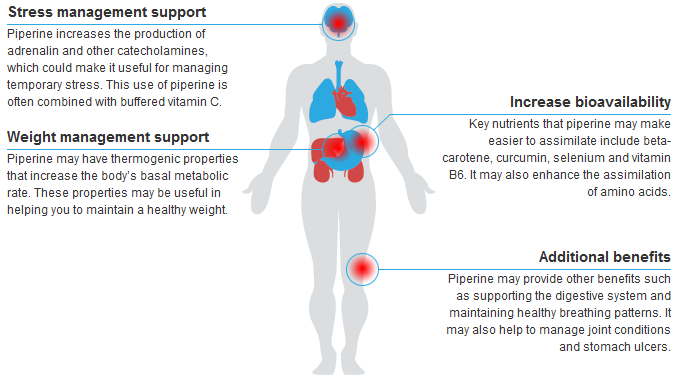Piperine, derived from black pepper and long pepper, is a versatile supplement that not only increases the absorption and efficacy of crucial nutrients like curcumin, selenium, and vitamin B6 but also supports weight management through its thermogenic effects, aids in stress relief, and provides additional benefits for respiratory health, digestion, and joint well-being.
Piperine is an alkaloid that gives black pepper (Piper nigrum) its pungency. It is slightly soluble in water and highly soluble in alcohol, chloroform and ether. Piperine has a long history of use in some types of traditional medicine. Its primary commercial use is in modern herbal medicine.
The commercial production of piperine generally consists of chemical extraction from black pepper seeds, which contains five to ten percent piperine. The seeds of the long pepper (Piper longum) contain one to two percent piperine and may also be used in piperine production. The seeds are dissolved with a solvent such as ethyl acetate and hexane. The solvent-free residue is then treated with a potassium hydroxide solution to remove the resin. The remaining residue is then rinsed in warm alcohol to yield piperine crystals.
The Danish chemist Hans Christian Orsted first isolated piperine from black pepper in 1819. It was later discovered in other Piper species such as long pepper and West African pepper (Piper guineense.) Piperine was first synthesized in 1882 by mixing piperidine and piperoyl chloride.
The primary value of piperine in health supplements is its ability to enhance the bioavailability of some other vitamins and minerals. This mechanism is still being studied, but piperine is known to inhibit the enzymes P-glycoprotein and CYP3A4 in humans. These enzymes are involved in the metabolism and transport of various metabolites. Animal studies also show that piperine inhibits CYP 450 enzymes that metabolize many drugs. In particular, piperine may increase the bioavailability of curcumin by a factor of 20.
Piperine may help to increase the availability of key nutrients. It may also be useful for additional purposes such as support for weight and stress management.
Piperine increases the production of adrenalin and other catecholamines, which could make it useful for managing temporary stress. This use of piperine is often combined with buffered vitamin C.
Piperine may have thermogenic properties that increase the body’s basal metabolic rate. These properties may be useful in helping you to maintain a healthy weight.
Key nutrients that piperine may make easier to assimilate include beta-carotene, curcumin, selenium and vitamin B6. It may also enhance the assimilation of amino acids.
Piperine may provide other benefits such as supporting the digestive system and maintaining healthy breathing patterns. It may also help to manage joint conditions and stomach ulcers.

You may want to take piperine if you need to increase the effect of other nutrients, such as curcumin, vitamin B6, beta-carotene and selenium. You may also benefit from piperine if you need help in maintaining a healthy weight or are experiencing short-term stress. Additional reasons to take piperine include breathing difficulties, problems with digestion, joint discomfort and low moods.
Shipping calculated at checkout
